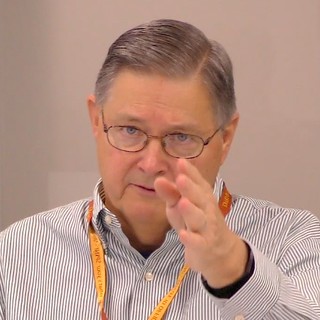It was the Watergate era when I first met Lee Edwards. Richard Nixon had resigned from the presidency, Gerald Ford had succeeded him, and the Democrats' "Watergate Class of 1974" had been swept into huge majorities in Congress.
Nixon was not a conservative; even so, it was a dark time for anybody who identified with the conservative movement that had emerged as a major force in American politics in the early 1960s. Sen. Barry Goldwater (R-Ariz.) was the first Republican in the movement to capture the party's presidential nomination.
Lee, as a young member of the movement's "first generation," was Goldwater's campaign press secretary. Goldwater was blown away after President John F. Kennedy was assassinated and succeeded by Lyndon Johnson. Johnson then proposed and implemented the "Great Society," a massive expansion of federal power and regulation that led directly to the Leviathan in the nation's capital.
Before the Goldwater campaign, Lee had been one of the prime movers behind the formation of Young Americans for Freedom, which mobilized thousands of young conservative college students, including serving as the first editor of YAF's magazine, New Guard.
In the wake of the Goldwater defeat, however, the Republican establishment, which was anything but conservative, went with Nixon in '68. Rather than repealing or reducing the Great Society welfare state, Nixon protected and in some respects even expanded it. Conservatives in Congress and the media were effectively back-benchers.
But Americans were listening and when the Watergate crisis unfolded, California Gov. Ronald Reagan, who had succeeded Goldwater as the conservative national leader, would have become the GOP's 1976 presidential nominee but for the treachery of Clarke Reed, the Mississippi Republican chairman who switched his delegation's vote to Ford.
Through it all, Lee was ever the optimist and always seeking new, more effective ways to communicate the conservative message of individual freedom, limited government, and a strong national defense.
Among much else he was doing during those dark days, Lee conceived and, with direct mail wizard Richard Viguerie's backing, founded the Conservative Digest magazine. He recruited me to be assistant editor in 1976. Meeting and working with Lee was one of the greatest blessings God put in my life.
It's not just that he taught me how to write, and to love and appreciate the expressive power of the English language. Lee knew, had worked with, and was respected by everybody who was anybody in the movement. He was a frequent source of solid advice and concern in the decades after he lured me from the University of Dallas graduate school to Washington, D.C., at the tender age of 25.
He was a patient teacher, gifted with an unusually sharp political perceptiveness, always the diplomat in awkward situations, courageous, and an unfailing gentleman. He could also deliver a firm scolding when appropriate, as it was one night during the 1980 GOP convention when he made clear his disappointment that I had awakened him while returning to the hotel room we shared after partying much too late!
Donald Devine, my old boss during the Reagan administration, put it well earlier this week in his National Review tribute, saying:
"He was the nicest person I have ever met. And at the same time, he was a prodigious author and exponent for our modern conservative movement — writing and editing 25 books plus uncountable articles. If you call yourself a conservative, Lee is the kind of person you should aspire to be."
Lee was indeed a prodigious author, and he was a superb historian. His "The Conservative Revolution: The Movement that Remade America" is the authoritative account, as is his history of the Heritage Foundation, "Leading the Way: The Story of Ed Feulner and the Heritage Foundation."
Lee's greatest ambition, besides seeing America returning to her conservative, constitutional roots, was to do his part in freedom's struggle against communism. With former Ambassador Lev Dobrianski, Lee co-founded the Victims of Communism Foundation, which is responsible for the Victims of Communism Memorial in Washington. D.C., that recognizes and remembers the millions of innocent victims of that tyrannical ideology.
If you aren't familiar with the 1966 movie mentioned in the headline, it is well worth watching the story of Saint Thomas Moore. Had Lee been born into Moore's position, I have no doubt he would have shown the same level of courage and devotion to truth and wisdom.
Tributes are pouring in for Lee, and I expect to see a lot of familiar faces from the past at the visitation for him this evening. There will not be a single person there with anything but the most lavish and sincere, and much deserved, praise for a good man we are all better for having known.










Join the conversation as a VIP Member